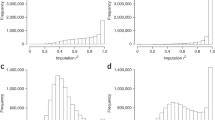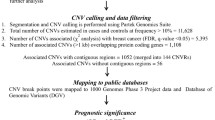Abstract
In addition to tumor invasion and angiogenesis, matrix metalloproteinase (MMP)9 also contributes to carcinogenesis and tumor growth. Genetic variation that may influence MMP9 expression was evaluated among participants of the Shanghai Breast Cancer Genetics Study (SBCGS) for associations with breast cancer susceptibility. In stage 1, 11 MMP9 single nucleotide polymorphisms (SNPs) were genotyped by the Affymetrix Targeted Genotyping System and/or the Affymetrix Genome-Wide Human SNP Array 6.0 among 4,227 SBCGS participants. One SNP was further genotyped using the Sequenom iPLEX MassARRAY platform among an additional 6,270 SBCGS participants. Associations with breast cancer risk were evaluated by odds ratios (OR) and 95% confidence intervals (CI) from logistic regression models that included adjustment for age, education, and genotyping stage when appropriate. In Stage 1, rare allele homozygotes for a promoter SNP (rs3918241) or a non-synonymous SNP (rs2274756, R668Q) tended to occur more frequently among breast cancer cases (P value = 0.116 and 0.056, respectively). Given their high linkage disequilibrium (D′ = 1.0, r 2 = 0.97), one (rs3918241) was selected for additional analysis. An association with breast cancer risk was not supported by additional Stage 2 genotyping. In combined analysis, no elevated risk of breast cancer among homozygotes was found (OR: 1.2, 95% CI: 0.8–1.8). Common genetic variation in MMP9 was not found to be significantly associated with breast cancer susceptibility among participants of the Shanghai Breast Cancer Genetics Study.

Similar content being viewed by others
Abbreviations
- LD:
-
Linkage disequilibrium
- MMP:
-
Matrix metalloproteinase
- SNP:
-
Single nucleotide polymorphism
References
Egeblad M, Werb Z (2002) New functions for the matrix metalloproteinases in cancer progression. Nat Rev Cancer 2(3):161–174
Bjorklund M, Koivunen E (2005) Gelatinase-mediated migration and invasion of cancer cells. Biochim Biophys Acta 1755(1):37–69
Deryugina EI, Quigley JP (2006) Matrix metalloproteinases and tumor metastasis. Cancer Metastasis Rev 25(1):9–34
Dechow TN, Pedranzini L, Leitch A, Leslie K, Gerald WL, Linkov I, Bromberg JF (2004) Requirement of matrix metalloproteinase-9 for the transformation of human mammary epithelial cells by Stat3-C. Proc Natl Acad Sci USA 101(29):10602–10607
Baruch RR, Melinscak H, Lo J, Liu Y, Yeung O, Hurta RA (2001) Altered matrix metalloproteinase expression associated with oncogene-mediated cellular transformation and metastasis formation. Cell Biol Int 25(5):411–420
Hanemaaijer R, Verheijen JH, Maguire TM, Visser H, Toet K, McDermott E, O’Higgins N, Duffy MJ (2000) Increased gelatinase-A and gelatinase-B activities in malignant vs. benign breast tumors. Int J Cancer 86(2):204–207
Somiari SB, Somiari RI, Heckman CM, Olsen CH, Jordan RM, Russell SJ, Shriver CD (2006) Circulating MMP2 and MMP9 in breast cancer—potential role in classification of patients into low risk, high risk, benign disease and breast cancer categories. Int J Cancer 119(6):1403–1411
Wu ZS, Wu Q, Yang JH, Wang HQ, Ding XD, Yang F, Xu XC (2008) Prognostic significance of MMP-9 and TIMP-1 serum and tissue expression in breast cancer. Int J Cancer 122(9):2050–2056
O’Mara TA, Clements JA, Spurdle AB (2009) The use of predictive or prognostic genetic biomarkers in endometrial and other hormone-related cancers: justification for extensive candidate gene single nucleotide polymorphism studies of the matrix metalloproteinase family and their inhibitors. Cancer Epidemiol Biomarkers Prev 18(9):2352–2365
Peters DG, Kassam A, St Jean PL, Yonas H, Ferrell RE (1999) Functional polymorphism in the matrix metalloproteinase-9 promoter as a potential risk factor for intracranial aneurysm. Stroke 30(12):2612–2616
Shimajiri S, Arima N, Tanimoto A, Murata Y, Hamada T, Wang KY, Sasaguri Y (1999) Shortened microsatellite d(CA)21 sequence down-regulates promoter activity of matrix metalloproteinase 9 gene. FEBS Lett 455(1–2):70–74
Zhang B, Ye S, Herrmann SM, Eriksson P, de MM, Evans A, Arveiler D, Luc G, Cambien F, Hamsten A, Watkins H, Henney AM (1999) Functional polymorphism in the regulatory region of gelatinase B gene in relation to severity of coronary atherosclerosis. Circulation 99(14):1788–1794
Sfar S, Saad H, Mosbah F, Gabbouj S, Chouchane L (2008) TSP1 and MMP9 genetic variants in sporadic prostate cancer. Cancer Genet Cytogenet 172(1):38–44
Rollin J, Regina S, Vourc’h P, Iochmann S, Blechet C, Reverdiau P, Gruel Y (2007) Influence of MMP-2 and MMP-9 promoter polymorphisms on gene expression and clinical outcome of non-small cell lung cancer. Lung Cancer 56(2):273–280
Sugimoto M, Yoshida S, Kennedy S, Deguchi M, Ohara N, Maruo T (2006) Matrix metalloproteinase-1 and -9 promoter polymorphisms and endometrial carcinoma risk in a Japanese population. J Soc Gynecol Investig 13(7):523–529
Woo M, Park K, Nam J, Kim JC (2007) Clinical implications of matrix metalloproteinase-1, -3, -7, -9, -12, and plasminogen activator inhibitor-1 gene polymorphisms in colorectal cancer. J Gastroenterol Hepatol 22(7):1064–1070
Jacobs EJ, Hsing AW, Bain EB, Stevens VL, Wang Y, Chen J, Chanock SJ, Zheng SL, Xu J, Thun MJ, Calle EE, Rodriguez C (2008) Polymorphisms in angiogenesis-related genes and prostate cancer. Cancer Epidemiol Biomarkers Prev 17(4):972–977
Elander N, Sûderkvist P, Fransën K (2006) Matrix metalloproteinase (MMP) -1, -2, -3 and -9 promoter polymorphisms in colorectal cancer. Anticancer Res 26(1B):791–795
Xu E, Xia X, Lu B, Xing X, Huang Q, Ma Y, Wang W, Lai M (2007) Association of matrix metalloproteinase-2 and -9 promoter polymorphisms with colorectal cancer in Chinese. Mol Carcinog 46(11):924–929
Li Y, Jin X, Kang S, Wang Y, Du H, Zhang J, Guo W, Wang N, Fang S (2006) Polymorphisms in the promoter regions of the matrix metalloproteinases-1, -3, -7, and -9 and the risk of epithelial ovarian cancer in China. Gynecol Oncol 101(1):92–96
Przybylowska K, Kluczna A, Zadrozny M, Krawczyk T, Kulig A, Rykala J, Kolacinska A, Morawiec Z, Drzewoski J, Blasiak J (2006) Polymorphisms of the promoter regions of matrix metalloproteinases genes MMP-1 and MMP-9 in breast cancer. Breast Cancer Res Treat 95(1):65–72
Roehe AV, Frazzon AP, Agnes G, Damin AP, Hartman AA, Graudenz MS (2007) Detection of polymorphisms in the promoters of matrix metalloproteinases 2 and 9 genes in breast cancer in South Brazil: preliminary results. Breast Cancer Res Treat 102(1):123–124
Lei H, Hemminki K, Altieri A, Johansson R, Enquist K, Hallmans G, Lenner P, Forsti A (2007) Promoter polymorphisms in matrix metalloproteinases and their inhibitors: few associations with breast cancer susceptibility and progression. Breast Cancer Res Treat 103(1):61–69
Hu Z, Huo X, Lu D, Qian J, Zhou J, Chen Y, Xu L, Ma H, Zhu J, Wei Q, Shen H (2005) Functional polymorphisms of matrix metalloproteinase-9 are associated with risk of occurrence and metastasis of lung cancer. Clin Cancer Res 11(15):5433–5439
Dos Reis ST, Pontes J Jr, Villanova FE, Borra PM, Antunes AA, Dall’oglio MF, Srougi M, Leite KR (2009) Genetic polymorphisms of matrix metalloproteinases: susceptibility and prognostic implications for prostate cancer. J Urol 181(5):2320–2325
Zheng W, Long J, Gao YT, Li C, Zheng Y, Xiang YB, Wen W, Levy S, Deming SL, Haines JL, Gu K, Fair AM et al (2009) Genome-wide association study identifies a new breast cancer susceptibility locus at 6q25.1. Nat Genet 41(3):324–328
The International HapMap Consortium (2003) The International HapMap Project. Nature 426(6968):789–796
de Bakker PIW, McVean G, Sabeti PC, Miretti MM, Green T, Marchini J, Ke X, Monsuur AJ, Whittaker P, Delgado M, Morrison J, Richardson A et al (2006) A high-resolution HLA and SNP haplotype map for disease association studies in the extended human MHC. Nat Genet 38(10):1166–1172
Barrett JC, Fry B, Maller J, Daly MJ (2005) Haploview: analysis and visualization of LD and haplotype maps. Bioinformatics 21(2):263–265
Lin DY, Zeng D, Millikan R (2005) Maximum likelihood estimation of haplotype effects and haplotype–environment interactions in association studies. Genet Epidemiol 29(4):299–312
Kader AK, Shao L, Dinney CP, Schabath MB, Wang Y, Liu J, Gu J, Grossman HB, Wu X (2006) Matrix metalloproteinase polymorphisms and bladder cancer risk. Cancer Res 66(24):11644–11648
Acknowledgments
This research was supported by USPHS grants R01CA64277, R01CA90899 and R01CA124558. The content is solely the responsibility of the authors and does not necessarily represent the official views of the National Cancer Institute or the National Institutes of Health. The authors wish to thank the participants and research staff of the Shanghai Breast Cancer Study for their contributions and commitment to this project, and Brandy Venuti for assistance with the preparation of this manuscript. Sample preparation and genotyping assays, using Affymetrix arrays, were conducted at the Survey and Biospecimen Shared Resource and the Vanderbilt Microarray Shared Resource, respectively, which are supported in part by the Vanderbilt Ingram Cancer Center (P30CA68485).
Author information
Authors and Affiliations
Corresponding author
Rights and permissions
About this article
Cite this article
Beeghly-Fadiel, A., Lu, W., Shu, XO. et al. MMP9 polymorphisms and breast cancer risk: a report from the Shanghai Breast Cancer Genetics Study. Breast Cancer Res Treat 126, 507–513 (2011). https://doi.org/10.1007/s10549-010-1119-1
Received:
Accepted:
Published:
Issue Date:
DOI: https://doi.org/10.1007/s10549-010-1119-1




